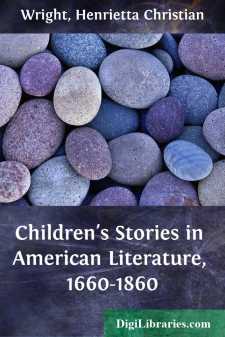Categories
- Antiques & Collectibles 13
- Architecture 36
- Art 48
- Bibles 22
- Biography & Autobiography 813
- Body, Mind & Spirit 142
- Business & Economics 28
- Children's Books 17
- Children's Fiction 14
- Computers 4
- Cooking 94
- Crafts & Hobbies 4
- Drama 346
- Education 46
- Family & Relationships 57
- Fiction 11829
- Games 19
- Gardening 17
- Health & Fitness 34
- History 1377
- House & Home 1
- Humor 147
- Juvenile Fiction 1873
- Juvenile Nonfiction 202
- Language Arts & Disciplines 88
- Law 16
- Literary Collections 686
- Literary Criticism 179
- Mathematics 13
- Medical 41
- Music 40
- Nature 179
- Non-Classifiable 1768
- Performing Arts 7
- Periodicals 1453
- Philosophy 64
- Photography 2
- Poetry 896
- Political Science 203
- Psychology 42
- Reference 154
- Religion 513
- Science 126
- Self-Help 84
- Social Science 81
- Sports & Recreation 34
- Study Aids 3
- Technology & Engineering 59
- Transportation 23
- Travel 463
- True Crime 29
Children's Stories in American Literature, 1660-1860
Description:
Excerpt
CHAPTER I
THE EARLY LITERATURE
One Sunday morning, about the year 1661, a group of Indians was gathered around a noble-looking man, listening to a story he was reading. It was summer and the day was beautiful, and the little Indian children who sat listening were so interested that not even the thought of their favorite haunts by brookside or meadow could tempt them from the spot. The story was about the life of Christ and his mission to the world, and the children had heard it many times, but to-day it seemed new to them because it was read in their own language, which had never been printed before. This was the Mohegan tongue, which was spoken in different dialects by the Indians generally throughout Massachusetts; and although it had been used for hundreds of years by the tribes in that part of the country its appearance on paper was as strange to them as if it had been a language of which they knew not a single word. It was just as strange to them, in fact, as if they had heard one of their war cries or love songs set to music, or had seen a picture of their dreams of the happy hunting grounds in that invisible western world where the sun went every night, and which they expected to see only after death.
The man who was reading the old story was John Eliot, an English missionary, who had devoted his life to the Indians, and whose ambition it was to leave behind him as his greatest gift the Bible translated into their own tongue. With this in view he set about making them familiar with the Christian faith, and established Sunday-schools among them, where men, women, and children alike were instructed.
From time to time they heard read stories from the New Testament which Eliot had translated, and in which he was greatly helped by one or two Indians who had gifts as translators, and could express the English thought into Indian words more fitting and beautiful than Eliot himself could have done. In all his earlier missionary work he also had the assistance of the great sachem Waban, because, as it happened, the first sermon Eliot ever preached to the Indians was delivered in Waban's wigwam. The text was from the old poetic words of Ezekiel—"Say to the wind, Thus saith the Lord God," etc.
The Indian name for wind was Waban, the old sachem's name, and he thought the sermon was addressed to him. He became an ardent convert and helped Eliot greatly in his work of Christianizing the tribes, and in particular in his trouble to keep peace among the sachems, who objected to the freedom of thought which the new religion taught, thinking that it interfered with their own authority over their people.
In a little book in which Eliot describes these grievances of the chiefs he calls them Pills for the Sachems, and says they were much harder to swallow than even the nauseous doses of their medicine men.
For the better instruction of the Indian children Eliot prepared a small primer, which was printed in 1669, eight years after the New Testament was printed. It was a curious little book, having the alphabet in large and small letters on the fly-leaf, and containing the Apostles' Creed, the Catechism, and the Lord's Prayer, with other religious matter....


